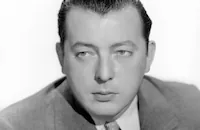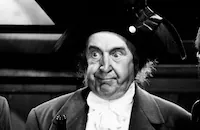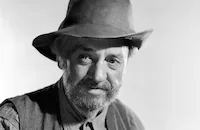The General Died at Dawn
Brief Synopsis
Cast & Crew
Lewis Milestone
Gary Cooper
Madeleine Carroll
Akim Tamiroff
Dudley Digges
Porter Hall
Film Details
Technical Specs

Synopsis
Chinese war lord General Yang, who controls one province, plans to take over all of China's twelve provinces and control all her silk, rice and opium markets. At present, however, he has only enough weapons to arm his closest men, and many of his soldiers are deserting him. Opposition general Wu uses this opportunity to send American soldier of fortune O'Hara to Shanghai to purchase weapons from American gunrunner Brighton, who will sell to the first bidder. The money, which O'Hara carries in a belt, was collected from Chinese peasants, half a million of whom are being oppressed by Yang. American Peter Perrie and his daughter Judy become involved in the fight when Perrie promises to deliver O'Hara to Yang, then purchase Brighton's weapons himself. Perrie has only six months to live and plans to steal some of the money so he and Judy can return to America, which Judy has never seen. Judy reluctantly lures O'Hara onto a train en route to Shanghai, and they fall silently in love. On the train, Perrie hands O'Hara over to Yang, who promises to follow Perrie by boat and arrive in Shanghai in time to exchange O'Hara for Brighton's weapons. At the Mansion House, a hotel in Shanghai, Wu, who is waiting for O'Hara, suspects the Perries when he finds Judy with O'Hara's monkey, "Sam." Perrie, meanwhile, uses some of O'Hara's money to purchase two tickets for a ship bound for America, which is scheduled to leave the following midnight. Judy, remorseful about her betrayal of O'Hara, tells her father she is in love and warns him not to skip town with the money. The avaricious Perrie is determined, however, and hides the money in the lining of his suitcase. That night, O'Hara escapes from Yang's boat and arrives at the Mansion House wounded. After Wu nurses his wound, O'Hara confronts Judy, who refuses to expose her father, but asks O'Hara to give the bearer of the belt two thousand dollars to escape. When O'Hara uncovers Perrie's hiding place, Perrie shoots him in the hand. O'Hara then shoots Perrie dead, and Judy confesses his identity. Yang and his guards then arrive and take Wu, O'Hara and Judy captive on Yang's boat, demanding the money. All insist they do not know its whereabouts, but after Yang shows them the corpse of one of Wu's agents, Judy offers to reveal the money's location in exchange for O'Hara and Wu's freedom. Yang agrees, but upon sensing O'Hara's love for Judy, cruelly orders him to kiss her goodbye. In their last few moments together, Judy explains her actions on the train, and O'Hara tells her they "could have made wonderful music together." Brighton then wakes up from a drunken stupor and, while searching for some whisky in Perrie's bags, finds the money. When the guards demand the money, Brighton insists that it is American currency and, while trying to escape in the dark, stabs Yang. As the general slowly dies, O'Hara, fearing for the lives of Judy and Wu, tells Yang the world will believe that his guards were disloyal and killed him. Yang, however, gives the guards orders to kill Judy and Wu, while O'Hara pleads with him to let them live so they can tell the story of his greatness. After O'Hara finally convinces Yang to save Judy, Yang orders his men to kill each other for the sake of honor, then dies. As dawn breaks, Judy and O'Hara embrace.

Director

Lewis Milestone
Cast

Gary Cooper

Madeleine Carroll

Akim Tamiroff

Dudley Digges

Porter Hall

William Frawley

J. M. Kerrigan
Philip Ahn
Lee Tung-foo

Leonid Kinsky
Val Duran
Willie Fung
Hans Furberg
John O'hara
Spencer Chan
Harold Tong
Charles Leong
Thomas Chan
Harry Yip
Swan Yee
Kam Tong
Frank Young
Carol De Castro
Walter Wong
Barnett Parker
Hans Von Morhart
Dudley Lee
Walter Lem
Thomas Lee
George Wong Wah
Tom Ung
Taft Jung
Sam Labrador
Richard Young
Jung Kai
Harry Leong
Chan Suey
Paul Tom
Loo Loy
Quon Gong
Wong Fong
Leo Abbey
Bob Jow
George Chan
Clifford Odets
Crew
Charles Althouse
Travis Banton
Harry Caplan
Hans Dreier
Ernst Fegté
A. E. Freudeman
Werner Janssen
Gordon Jennings
William Lebaron
Louis Mesenkop
Harry Mills
Victor Milner
Boris Morros
Clifford Odets
Art Smith
Count Andrey Tolstoy
Hal Walker
Eda Warren
Wally Westmore
Adolph Zukor

Film Details
Technical Specs

Award Nominations
Best Cinematography
Best Score
Best Supporting Actor
Quotes
I like people too much to shoot. But it's a dark year and a hard night.- O'Hara
We could've made wonderful music together.- O'Hara
Trivia
Notes
This film's working title was Chinese Gold. A Hollywood Reporter news item reported that during the production of this film, Hollywood was suffering a Chinese actor shortage due to the filming of M-G-M's epic, The Good Earth (see below). Exploitation press for the film gives the following information about the production: Because Paramount needed 700 Chinese extras, Chinese farmers from the San Joaquin Valley of California were hired. Paramount borrowed seven hundred Springfield rifles from gun supplier J. M. Stembridge of Los Angeles for this film. Harry Caplan was in charge of procuring fifty vultures, which he borrowed from Texas under a game warden's supervision. A half-mile's worth of narrow Chinese streets were built. American composer Werner Janssen wrote a 600-page score for the production, which marked his first venture in pictures. In the picture, Madeleine Carroll plays the "yum-kum," an old musical instrument.
An article in New York Times gives the following information on the Yangtse junk used in the film: A crew of twenty Yangtse sailors was brought over from China to man a 50-foot junk. Paramount Studios' enormous "T-tank," a sunken, concrete-lined hole used for ocean or bath scenes, housed the junk during filming. (The Chinese crew refused to man the junk until art director Ernst Fegté painted two eyes on the front of it.) The junk's matting sails, anchor and gallery iron pots were imported from China for the film. The article also states that actor Dudley Digges' Confucian makeup took two hours a day to apply.
Contemporary sources state that this film marks the first screen work for New York playwright Clifford Odets. According to a modern source, an article published in The Daily Worker on August 23, 1937 identified Odets as a left-wing playwright and stated that when asked if he purposefully wrote social comment into his screenplays, Odets said, "Well, I got away with some stuff in The General Died at Dawn." Fifteen years later, the House Un-American Activities Committee used the Daily Worker interview as evidence to support their contention that Odets' writing was subversive. While testifying before HUAC, Odets stated: "The whole matter was nonsense because The General Died at Dawn is a picture that starred Gary Cooper and [was] done by Paramount. There was nothing of any subversive nature in it." Notably, one of Cooper's lines reads, "What's better work for an American than fighting for Democracy."
Press information states that Odets had a cameo role in a railroad car scene, for which he was paid five dollars a day. According to Variety, director Lewis Milestone and Hollywood columnist Sidney Skolsky "allegedly" also made cameo appearances in the film, but were not identified by the reviewer. A modern source, however, lists Odets, Skolsky and Milestone along with novelist John O'Hara (who received credit in reviews) in the cast as "reporters." A modern source lists Sarah Edwards and Paul Harvey in the cast as an "American couple."
As reported in Motion Picture Herald, Count Andrey Tolstoy, a descendant of Count Leo Tolstoy who is credited as technical advisor, was formerly a soldier of fortune in China and was employed as an aide to General Chang Tze Lin. A Hollywood Reporter news item states that this film marked the end of Milestone's one-year directorial contract with Paramount. Production charts in Hollywood Reporter throughout the production credit Charles Althouse with sound, although he is not credited on the film. Production charts from the middle of the shooting schedule list Roy Lim and Tetsu Komai in the cast, although no information to verify their work on the film has been located. Akim Tamiroff was nominated for an Academy Award for Best Supporting Actor; Victor Milner was nominated for Best Cinematography; and Werner Janssen was nominated for Best Score for this film.

Miscellaneous Notes
Released in United States 1936
Released in United States on Video March 1989
Released in United States 1936
Released in United States on Video March 1989











